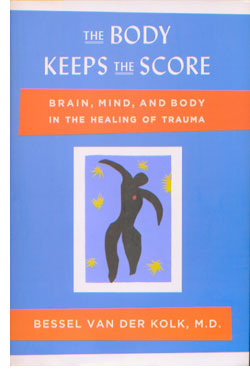 |
 |
 Bessel van der Kolk
Bessel van der Kolk
The Body Keeps the Score: Brain, Mind, and Body in the Healing of Trauma
Viking / Penguin
US Hardcover First Edition
ISBN 978-0-670-78593-3
Publication Date: 09-25-2014
444 Pages; $27.95
Date Reviewed: 01-06-2015
Reviewed by: Rick Kleffel © 2015s
Index
Non-Fiction
We like to think of science as a sort of understanding of the world or any denizen thereof. But that becomes more than problematic when we're trying to understand our minds. Even with the latest tools of neuroscience, quantifying what happens to us on an emotional level is difficult. Simple words acquire diverse and even divisive meanings, even though the effects are obvious. We know when we are damaged, and we call the result trauma. But what that means, and what we can do about it is still the subject of scientific debate.
'The Body Keeps the Score: Brain, Mind, and Body in the Healing of Trauma' by Bessel van der Kolk, M. D. is a stunning work that combines years of in-the-field experience, work in a variety of fields by scientists, therapists and patients in a compelling story of the frontiers of psychiatric science. Van der Kolk is legendary figure in the field, and here he brings his scientific and storytelling expertise to take readers into the heart — and mind — of human trauma.
The book is divided into five parts. Parts One and Two, "The Re-Discovery of Trauma," and "This is Your Brain on Trauma," offer readers a starter course on what we know today about trauma. Van der Kolk starts with his own experience, treating Vietnam veterans back in the 1960's, before we really had any of the formal understanding that we do today. He combines patient stories with science and the story of his own work in lively, engaging prose.
In Part 3, "The Minds of Children," the author looks at childhood development and in particular what is now called "attachment experience." Van der Kolk is a superb advocate for childhood experience. His understanding of childhood trauma is nuanced and unique. He believes that it is of an entirely different order than what we usually comprehend the word to mean. Here he lays the ground for a quiet scientific revolution.
Memory is a key aspect of trauma, discussed by van der Kolk in Part 4, "The Imprint of Trauma," and the final key leading to the core of the book, "Paths to Recovery." He's quite direct. "Nobody can 'treat' a war, or abuse, rape, molestation, or any other horrendous event, for that matter; what has happened cannot be undone. But what can be dealt with are the imprints of trauma on body, mind and soul." He then works his way through owning your self, talk therapy, yoga, EMDR (Eye Movement Desensitization and Reprocessing), neurofeedback, and community and theater. This all proves to be gripping reading, informative and practical.
All this sounds great on the page, but credit van der Kolk with more than good ideas. He's a great writer as well. As you read 'The Body Keeps the Score,' the author's excellent organizational skills keep all the ideas corralled in short sections. He's concise and witty while he hews to the science, but shows the sort of emotional depth required in what is a scientific study of damaged emotions. Suffice it to say that van der Kolk not only has something important to say, he knows how to say it in a manner that is easily, even entertainingly understood.
Van der Kolk begins his Epilogue with a now-familiar directness. "We are on the verge of becoming a trauma-conscious society." His goal, he tells us, is to "translate brain science into everyday practice." 'The Body Keeps the Score' is an astonishing first step in this direction. We are our own biggest problem, and we'll need to understand how we break in order to fix ourselves.
|
 |
|
|
 |
| |
Review Archive
All Reviews alphabetized by author.
General Fiction
Non-Genre, general fiction and literature.
Horror
Supernatural fiction, supernatural horror and non-supernatural horror.
Science Fiction
Science fiction, science fantasy, speculative fiction, alternate history.
Fantasy
Fantasy, surrealism and magic realism.
Mystery
Crime, thrillers, mystery, suspense.
Non-Fiction
Non-Fiction, True Crime, Forteana, Reference.
Poetry
|
|
 |
|




